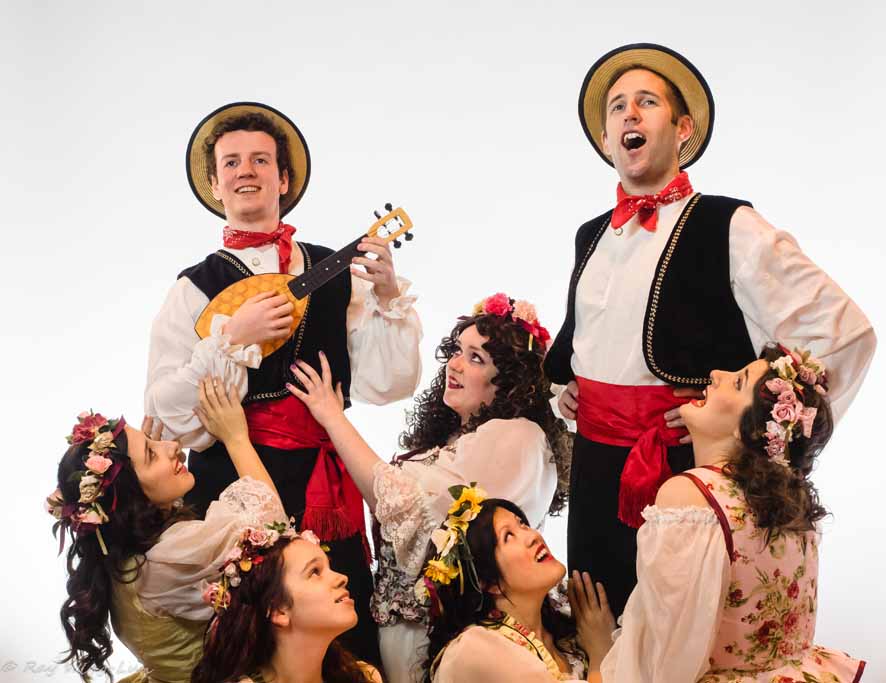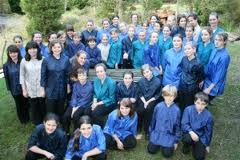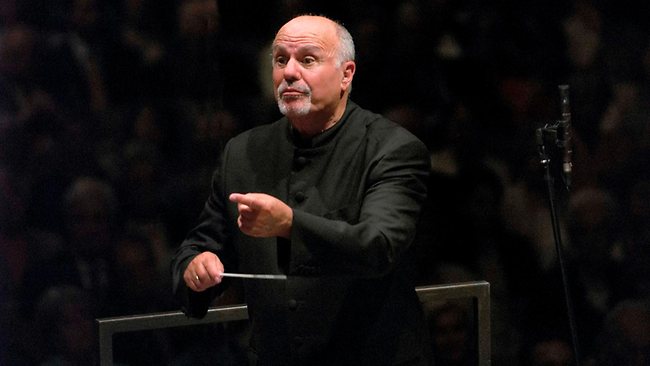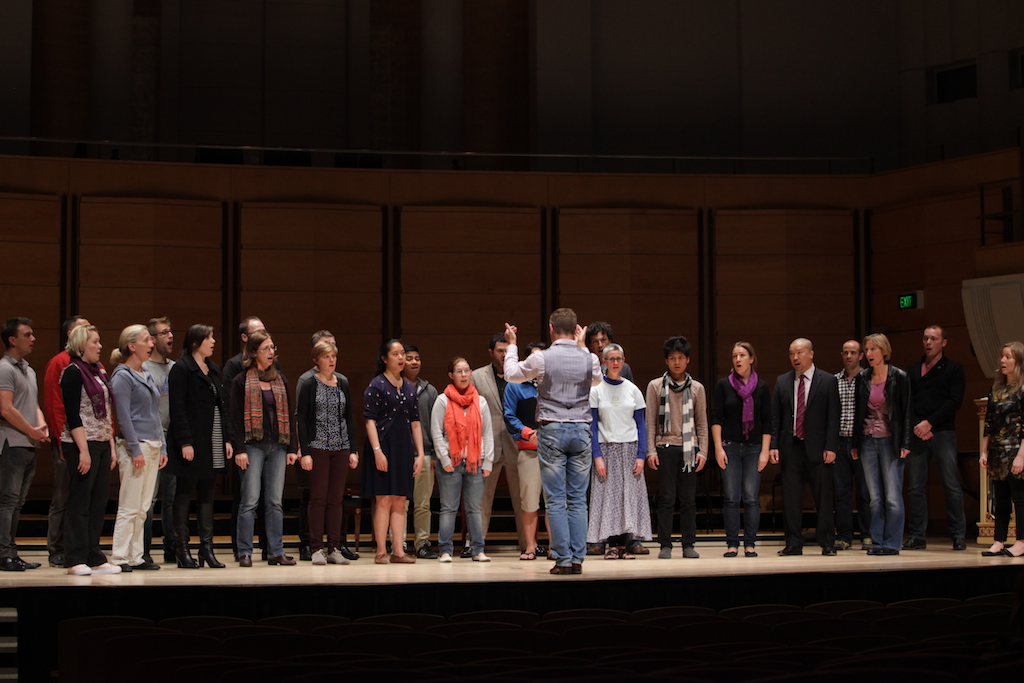Review: Bittersweet Obsessions: Monteverdi And Bach/ Australian Brandenburg Orchestra

Bittersweet Obsessions: Monteverdi and Bach
Australian Brandenburg Orchestra
City Recital Hall
25 October 2017
The Australian Brandenburg Orchestra’s Bittersweet Obsessions: Monteverdi and Bach is an engaging pastiche of early and baroque music, performed in a dramatised setting by thirteen members of the orchestra, led by concertmaster Shaun Lee-Chen. Joined by four vocal soloists – New Zealand soprano Natasha Wilson, tenors Karim Sulayman from America and Australian Spencer Darby and Danish baritone Jakob Bloch Jesperson, the ensemble was directed from the harpsichord by ABO artistic director, Paul Dyer.
Director Constantine Costi, lighting designer John Rayment and set designer Charlotte Mungomery created an undeniable sense of theatre with the stage set for story-telling, adorned with a backdrop featuring a pastoral scene, tufts of grass scattered about the stage whilst musicians occupied a makeshift ‘pit’ on the auditorium floor. A fine mist filled the air as the cymbals built to a crescendo introducing the curtain raiser, Giovanni Girolamo Kapsberger’s Toccata arpeggiata – a cameo for the theorbo. Kapsberger took the theorbo to new heights as a solo instrument, and this arpeggiated piece with its unusual rhythms and syncopations, brilliantly played by Tommie Andersson certainly set the scene for the evening. In this arrangement, the theorbo was joined by several other instruments, percussion effects and an attractive vocalise from Wilson. For the more curious members of the audience the source of the arrangement would have made the excellent programme notes just a little more complete.
This programme is another of the ABO’s ventures into combining theatre with their customary instrumental offerings. Dyer chose two of Monteverdi’s celebrated compositions which paved the way for the development of opera. The Lamento della ninfa is a setting of a canzonetta with text by Rinuccini. Clad in costumes by Genevieve Graham, the three male voices singing the parts of the shepherds, captivated with an easy blend and even balance, delivered in pure style. Wilson’s incisive, rich and bright tones soared against the antiphon of the men.
The palate-cleansing, dance-like Ciaccona by the Neapolitan Andrea Falconieri, invigorated by the rhythm of the castanets, faded to Monteverdi’s Overture to Il ritorno d’Ulisse in patria, presaging Monteverdi’s other significant setting of verse by Tasso, the Combattimento di Tancredi et Clorinda, written for a private performance for Girolamo Mocenigo in Venice. The pastoral backcloth gave way to reveal scaffolding, skilfully used to project the surtitles as well as to depict the two protagonists, ably performed by Wilson and Jesperson, with Sulayman proving a very gifted narrator, using his light and lucid voice to excellent dramatic effect. On stage, character surrogates and Aikido performers Melanie Lindenthal and Andrew Sunter enacted the scenes of combat between Tancredi and Clorinda, with Clorinda’s death proving an especially vivid moment enhanced by the lighting design. The instrumentalists had their own points to make with Monteverdi’s pioneering orchestration depicting the sounds of the horses, the battle and painting a picture in music of Clorinda’s death. The singers and instrumentalists maintained an excellent sense of ensemble with the singers moving seamlessly from declamatory statements to arioso style. The drama closed with a sobering epilogue in the form of Giovanni Maria Trabaci’s Conzonanze stravaganti.
The familiar strains of the first movement of JS Bach’s Brandenburg Concerto no 4, BWV 1049, opened the post-interval segment, performed by just one instrument per part. Shaun Lee-Chen dazzled with his ornamentation. However, taken at a sprightly tempo, the overall effect was buoyant but may have been the source of some lack of cohesion within the ensemble.
It was a pleasing preamble to Bach’s Schweigt stille, plaudert nicht (Be still, stop chattering), BWV 211 which is better known as the Coffee Cantata. A rare secular vocal work by the great master, it is more of a comic operetta than a cantata and satirises the fascination at the time with coffee, an exotic import that was considered to be a social evil. Transported by Costi and his creative team to present times, Sulayman’s Narrator was a barista whose bar would be the envy of every self-respecting barista in Sydney. Jesperson as Schlendrian the father, and Wilson as Lieschen the brattish daughter, locked horns in a perennial predicament as the parent battling to set boundaries for the wilful and defiant child.
Natasha Wilson carried her role with comic flair. Her aria Ei! Wie schmeckt der Kaffee süße with the baroque flute played by Melissa Farrow was a highlight, proving a voice that is well-anchored though agile and consistently beautiful through her range. Supported by the Kiri Te Kanawa and Dame Malvina Major Foundations, her aesthetic and timbre are well suited to early styles. She is an emerging singer of great promise and is someone to watch with interest.
Accompanied by comprehensive notes, insights, biographies and illustrations in the printed programme, Bittersweet Obsessions is an assemblage of works which can stand alone on their musical merits. However, the ABO’s striking dramatisations and the interpolation of related smaller works, adds an extra dimension and brings these masterworks to life in a most entertaining way.
Shamistha de Soysa for SoundsLikeSydney©
The Australian Brandenburg Orchestra’s Bittersweet Obsessions continues at the City Recital Hall in Sydney on selected days until 1 November 2017.







